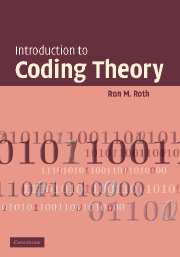Book contents
- Frontmatter
- Contents
- Preface
- 1 Introduction
- 2 Linear Codes
- 3 Introduction to Finite Fields
- 4 Bounds on the Parameters of Codes
- 5 Reed–Solomon and Related Codes
- 6 Decoding of Reed–Solomon Codes
- 7 Structure of Finite Fields
- 8 Cyclic Codes
- 9 List Decoding of Reed–Solomon Codes
- 10 Codes in the Lee Metric
- 11 MDS Codes
- 12 Concatenated Codes
- 13 Graph Codes
- 14 Trellis and Convolutional Codes
- Appendix: Basics in Modern Algebra
- Bibliography
- List of Symbols
- Index
- Frontmatter
- Contents
- Preface
- 1 Introduction
- 2 Linear Codes
- 3 Introduction to Finite Fields
- 4 Bounds on the Parameters of Codes
- 5 Reed–Solomon and Related Codes
- 6 Decoding of Reed–Solomon Codes
- 7 Structure of Finite Fields
- 8 Cyclic Codes
- 9 List Decoding of Reed–Solomon Codes
- 10 Codes in the Lee Metric
- 11 MDS Codes
- 12 Concatenated Codes
- 13 Graph Codes
- 14 Trellis and Convolutional Codes
- Appendix: Basics in Modern Algebra
- Bibliography
- List of Symbols
- Index
Summary
Do ye imagine to reprove words?
Job 6:26This book has evolved from lecture notes that I have been using for an introductory course on coding theory in the Computer Science Department at Technion. The course deals with the basics of the theory of error-correcting codes, and is intended for students in the graduate and upper-undergraduate levels from Computer Science, Electrical Engineering, and Mathematics. The material of this course is covered by the first eight chapters of this book, excluding Sections 4.4–4.7 and 6.7. Prior knowledge in probability, linear algebra, modern algebra, and discrete mathematics is assumed. On the other hand, all the required material on finite fields is an integral part of the course. The remaining parts of this book can form the basis of a second, advanced-level course.
There are many textbooks on the subject of error-correcting codes, some of which are listed next: Berlekamp [36], Blahut [46], Blake and Mullin [49], Lin and Costello [230], MacWilliams and Sloane [249], McEliece [259], Peterson and Weldon [278], and Pless [280]. These are excellent sources, which served as very useful references when compiling this book. The two volumes of the Handbook of Coding Theory [281] form an extensive encyclopedic collection of what is known in the area of coding theory.
One feature that probably distinguishes this book from most other classical textbooks on coding theory is that generalized Reed—Solomon (GRS) codes are treated before BCH codes—and even before cyclic codes.
Information
- Type
- Chapter
- Information
- Introduction to Coding Theory , pp. ix - xiiPublisher: Cambridge University PressPrint publication year: 2006
